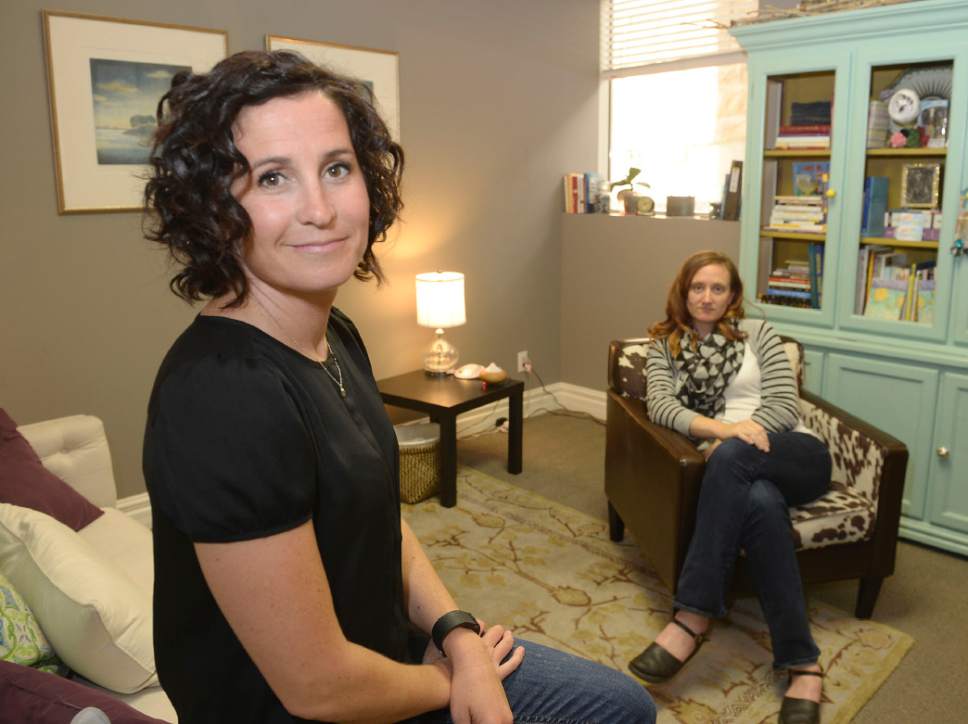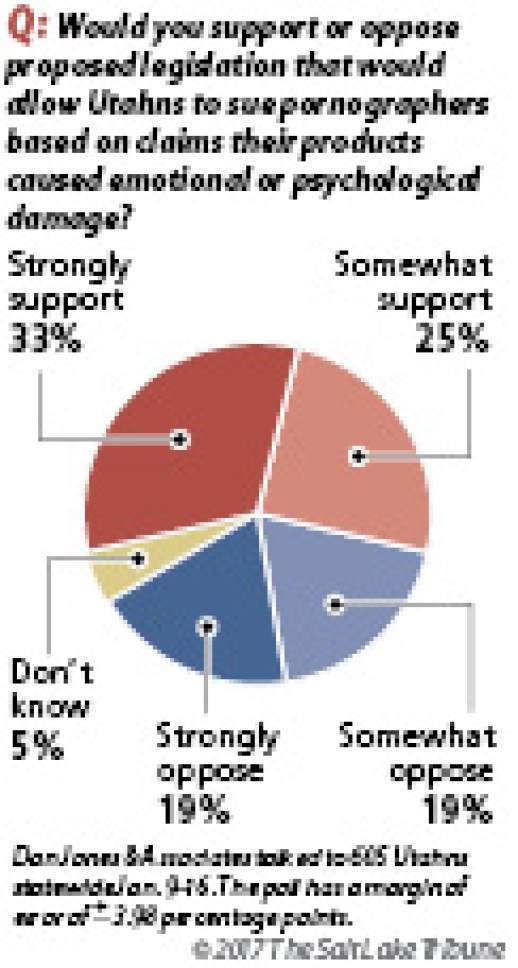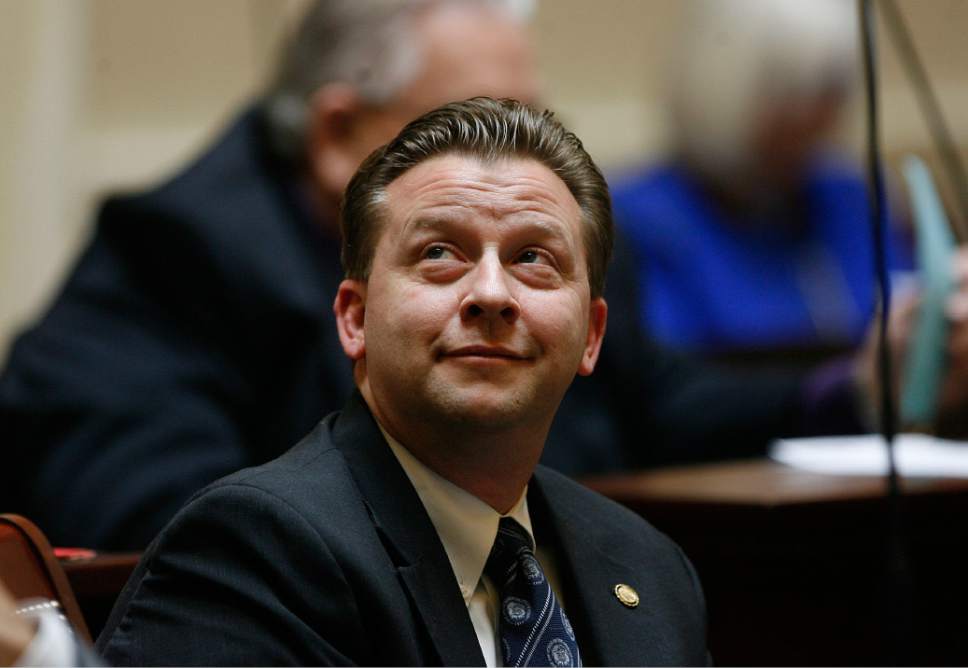This is an archived article that was published on sltrib.com in 2017, and information in the article may be outdated. It is provided only for personal research purposes and may not be reprinted.
Salt Lake City resident Dawna Lopez worries about what her teenage son sees online.
She said his classmates were able to access graphic images on school computers, and while the school took steps to prevent that from happening again, it couldn't change the past.
"To me, that is scary," Lopez said. "They had them in the first place, so the damage has been done."
Lopez is among 57 percent of Utahns who support legislation that would open the door to lawsuits against pornographers when their products cause emotional or psychological damage, according to a recent Salt Lake Tribune/Hinckley Institute of Politics poll.
"If it puts them out of business," Lopez said, "so be it."
The proposal is sponsored by Sen. Todd Weiler, R-Woods Cross, who last year successfully sponsored legislation labeling pornography a "public health crisis" in Utah.
His pornography lawsuit bill has not yet been made public, but he said it would apply only to children who have been harmed by graphic adult material. "The only cause of action would be if someone under the age of 18 is exposed to pornography," he said. "What I'm really interested in is if a parent has spent thousands of dollars in counseling and rehab for a child, that they would have an ability to recover those expenses."
Weiler's bill is opposed by 37 percent of voters, according to the poll, with another 5 percent undecided.
Women were more likely to support the proposal than men — 63 percent and 50 percent, respectively.
While very active and somewhat active Mormons were supportive, with 73 percent and 52 percent responding in favor, respectively, Catholics, Protestants, inactive members of The Church of Jesus Christ of Latter-day Saints and the non-religious all opposed the bill.
The bill was also supported by Republican voters — 69 percent — and unaffiliated voters — 52 percent — but opposed by Democrats – 62 percent.
The poll of 605 registered voters was conducted Jan. 9-16 by Dan Jones & Associates and has a margin of error of 3.98 percentage points.
Weiler said the poll results were consistent with his feedback on the bill. But he added that he expects support to increase as more Utahns learn about the specifics of his plan.
That's because in addition to establishing the grounds for a lawsuit, he said, the bill creates a "safe-harbor" that would protect pornographers from litigation in certain cases.
Under the bill, pornography distributors would be legally protected if they included warning notifications on their products, and made a good-faith effort to limit access to adult customers.
"We're asking these adult websites to be good corporate citizens and to help us help the state to protect children in their innocence," Weiler said. "If someone is 18 and they choose to look at pornography, that's their decision. Despite everything I've been accused of, I'm not telling people what they can and can't look at."
Kristin Hodson, a certified sex therapist and founder of Midvale's The Healing Group, said she doesn't always see eye-to-eye with Weiler's approach to pornography, but that she is receptive to elements of his lawsuit bill.
"We can all agree that we don't want our kids learning about sex from porn," she said. "That is a common ground."
She said the safe-harbor concept is appropriate, in that it offers pornographers incentives to minimize their reach among youth. But Hodson questioned the premise of suing content creators for damages.
She said there can be issues surrounding and contributing to abuse of pornography, but treatment of those issues should not be based in the premise that pornography itself is addictive and harmful.
"Who should be sued, in my opinion, are the treatment centers who are identifying issues around pornography as addictive," she said. "They're spending $40,000 on an unfounded treatment approach."
Hodson also said the state lacks a clear, legal definition of what is and is not pornography, which creates too much room for interpretation within the laws on graphic materials.
"You're going to have people who think the Sears Catalog is porn," she said.
Weiler has good intentions, Hodson said, but is focusing his fight in the wrong areas. Instead of clearing the way for lawsuits, she said the state should be equipping children with accurate information on human sexuality along with the tools they need to navigate the digital world.
"This doesn't continue to empower our kids," she said. "We're still just basically treating it from a victim standpoint."
Weiler said he hopes the pressure from his bills — he's sponsoring another proposal to require WiFi filtering at public libraries — as well as similar efforts in other states will create a business environment where pornography distributors elect to self-regulate to protect children.
Determined children may be able to get around age restrictions, Weiler said, but a sincere effort to avoid access by minors would protect a website under his bill.
"It can't just be 'click here if you're over 18,' I don't think anybody thinks that stops anybody," Weiler said. "I would love for them to ask for a credit card number or a driver license number, something that an 11-year-old couldn't easily provide."
Many of the precise applications of his bill would be up for the courts to decide, Weiler said, but even websites based out-of-state would have to weigh the cost of doing nothing to prevent exposure to children.
"If they're processing credit card transactions from people in Utah," he said, "I think there would be an argument there that they have availed themselves to the courts of Utah."
Twitter: @bjaminwood







